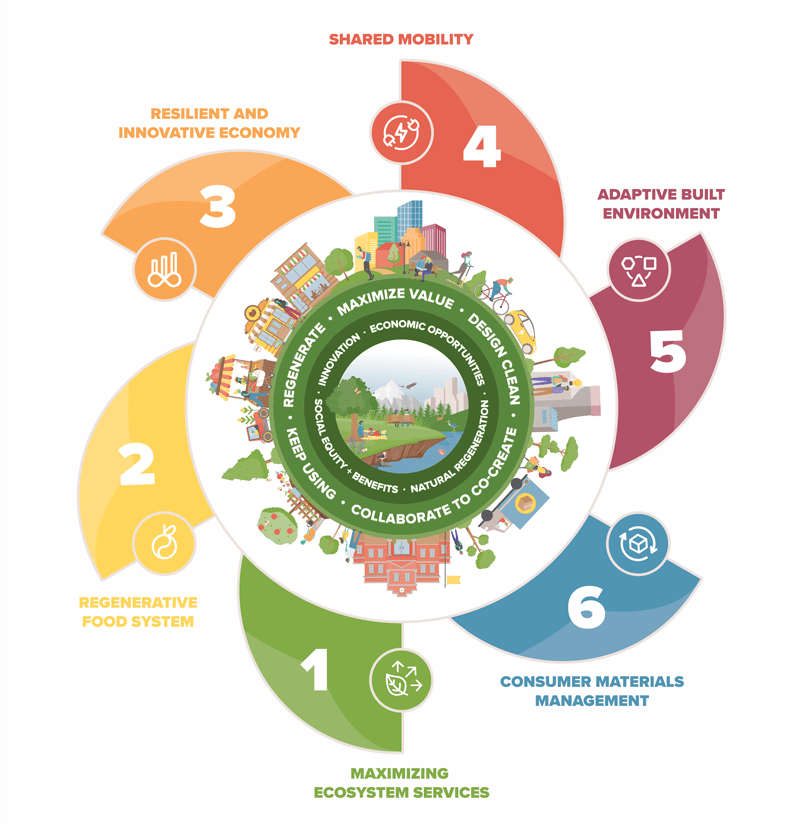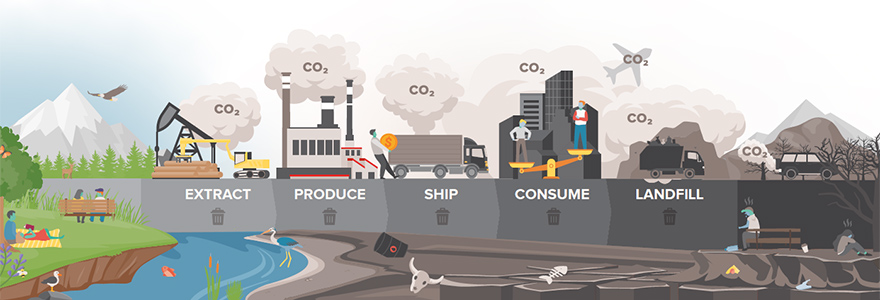Accelerating Circularity
The Richmond Circular City Strategy outlines a framework that will guide the City's transition to a circular economy.
The City of Richmond is a recognized leader in Sustainability and is implementing the Richmond Circular City Strategy. This strategy guides the City’s policies, programs, and services to achieve a 100% circular economy by 2050. As part of the strategy, the City has launched the online Circular Learning Hub and is actively working to reduce embodied carbon emissions by exploring opportunities for increased resource efficiency and the implementation of innovative solutions.
Visit the Circular Learning Hub to access articles, videos, success stories and tools. These resources are designed to enhance understanding, inspire innovative ideas, and support Richmond’s journey toward a more circular, low-carbon, and resource-efficient future.
Circular Learning Hub
The circular economy combines economic growth with a development cycle that preserves and enhances natural capital, optimizes resource production and minimizes risk through the management of limited resources and renewable loops. Additionally, it enables companies to reduce production costs and losses, generate new sources of revenue and reduce their dependence on natural raw materials.

Linear economy
The current linear economic model for the production of goods and services is based on raw material being used on a ‘take-make-use-dispose’ cycle. This model boosts short-term consumption that does not use resources sustainably.
 Linear Economy Model
Linear Economy Model
In nature, there are no waste or landfills; all materials and elements fulfill a function continuously in the ecosystems and are reused in different ways. The ‘take-make-use-dispose’ model strongly challenges the life cycle of nature and conflicts with sustainable development.
Why do we need to move to a circular economy?
If the consumption of natural resources remains in the linear model, the reserves available for some materials will be depleted in a few decades. Coupled with inadequate waste disposal, this over-exploitation of natural resources has also led to environmental problems such as climate change, soil contamination, natural capital lost and human health problems. Therefore, it is necessary to rethink the use and application of resources, energy and other assets in our economy and communities.
A circular economy can have a variety of positive impacts that go beyond economics and the environment, including the elimination of waste and pollution, preserving products and materials and regenerating natural systems, all playing an important role in the achievement of climate change targets. This gives Richmond the option to grow prosperity, jobs and resilience while reducing greenhouse gas emissions, waste and pollution.
What is the City doing?
Circular Cities & Regions Initiative (CCRI)
In June 2021, the City of Richmond was one of 15 local governments selected to participate in the Canadian Circular Cities & Regions Initiative (CCRI) program that is designed to promote Peer-to-Peer networking to bring together communities and exchange best practices for implementing circular economy strategies and policies.Having access to one-on-one mentoring and support from advisors representing leading Canadian and international leaders and practitioners and direct interaction with subject matter experts, Richmond will further develop the City’s unique circular economy roadmap.
Richmond will continue to be a municipal leader in the transition to a circular economy, where waste is designed out, natural systems are regenerated and products and materials are kept at their highest utility and value.
Circular Economy criteria for City purchasing activities
In January 2021, City Council integrated circular economy criteria into their purchasing policy. The revised policy includes a City definition of circular economy to allow staff and stakeholders to make more informed decisions and better understand how to drive suppliers towards circularity while achieving City's goals and strategies. The policy includes the following:- Circular economy criteria that contributes to sustainability goals, reduce environmental and social impacts and potentially improve value and generate financial benefits into City projects and operations.
- The circular approach included in the Policy entails a systemic multi-level change toward circular economy, including technological innovation, new business models and stakeholder collaboration, by understanding more fully the potential life cycle impacts and potential benefits of available options.
- A circular procurement ensures that value is retained and impacts are minimized through lifetime optimization.
The circular economy principles allow tracking incremental progress as circularity is applied to existing and future procurements. This allows feedback, learning and adjustment to occur in an environment of continuous improvement.
Circular Economy and climate actions
Greenhouse gas (GHG) emissions from the management of liquid and solid waste in Richmond constituted 2.2 per cent of municipal emissions in 2017. But these statistics only incorporate direct emissions such as methane emissions from anaerobic decomposition of waste. From a Circular Economy perspective, the production, transportation and retailing of products used by consumers and businesses are responsible for a significantly larger amount of carbon emissions from sectors of the economy that extend beyond municipal waste management. Globally, 45 per cent of carbon emissions originate from the production of vehicles, consumer goods and food, as well as construction materials used in buildings.
Traditional product development uses a linear ‘take-make-waste’ approach. Learn more about the circular economy strategic direction in Richmond's Community Energy and Emissions Plan 2050.
Past reports to Council
The following reports give a greater insight into the City's efforts to accelerate its progression towards a circular economy.
| Date | Report | Agenda Item # | Meeting Minutes |
|---|---|---|---|
| March 11, 2024 | Reducing Embodied Carbon in the Built Environment | 17 | Minutes |
| June 26, 2023 | Circular Procurement Policy | 8 | Minutes |
| April 24, 2023 | Richmond Circular City Strategy | 11 | Minutes |
| Oct 11, 2022 | Richmond Circular City Strategy | 10 | Minutes |
| Feb 7, 2022 | Community Energy and Emissions Plan 2050 | 1 | Minutes |
| Apr 12, 2021 | City Participation in Circular Cities and Regions Initiative |
14 | Minutes |
| Feb 22, 2021 | Procurement Policy Enhancements with Circular Economy Criteria | 12 | Minutes |
| May 27, 2019 | Integrating Circular Economy Criteria into City Procurements | 10 | Minutes |
CircularEconomy@richmond.ca 604-204-8643

